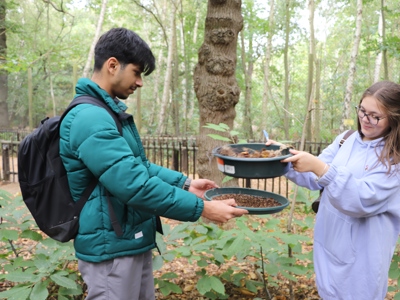
Over 16s
Students 16 years and older (College, A-level, IB, University)
We are pleased to offer a variety of activities for older students which are designed to fit your curriculum requirements.
Many of our visiting groups prefer a bespoke half-day or full-day of activities delivered by our tutors; the activities below are examples of what we can offer.
Guided Tours
General tour
A one-hour tour around our park on the subject of your choosing, such as animal ecology or husbandry, but we can put together a tour based on your educational needs. We visit the animals most relevant to your subject choice.
Conservation tour
One-hour: A tour around our park where we focus on our current animal breeding and rewilding projects.
Two-hour: A tour which includes more animals than the one-hour tour, and can also include a 15-minute yard tour behind the scenes with a member of our Conservation team in our small mammal rescue and breeding facilities. Here you may see water voles, harvest mice, dormice or shrews. This option is dependent on seasonal animal activity and staff availability, so please let us know as soon as possible if you would like to include this in your tour. Please note this is limited to small groups of 10 students at a time.
Wellbeing tours
One-hour: Combine positive conservation stories with immersion in an ancient woodland, noticing how connecting with nature benefits your mental health.
Two-hour: The longer wellbeing tour is likely to also include a session in our bushcraft area.
Woodland Ecology Techniques
All of these activities take place outdoors in our beautiful ancient woodland. You can request one or several of these activities, depending on your desired educational outcomes and curriculum requirements. All visits are priced at the half-day or full-day tutor rates, depending on how many activities you would like during your visit.
Comparison of two different coppice areas
We have coppices of different ages within our ancient woodland setting, meaning students can compare variables such as invertebrate diversity, plant diversity or percentage cover of a particular plant alongside abiotic factors.
International Baccalaureate
Students can make use of our woodland site for data collection for their Internal Assessment. Having formulated a research question, identified vairables and equipment needed, students can carry out their methodology at our site with tutors on hand to help. Please contact us with your proposed research questions so we can ensure they are feasible for the time of the year you are visiting.
Invertebrate leaf litter sampling
Conduct random sampling with sieves and pooters to investigate invertebrate diversity in our woodland, incorporating measuring abiotic factors such as light, temperature and humidity.
Invertebrate mark and recapture
Learn why we conduct mark and recapture studies, before marking our study species (typically woodlice). Continue with other planned activities, and see how many individuals you recapture at the end of the day for analysis.
Line transect
Taking place through a gradient of deciduous to coniferous woodland, sampling insect diversity with changing abiotic factors.
Random sampling using quadrats
Start with a discussion of why and how we randomise sampling, then practice setting up quadrats and identifying woodland plants within them.
Small mammal trapping
Available from September through March. Students will learn why we catch small mammals, what sort of traps we use, and how to set them correctly. Students will then work together to weigh, sex and identify the species of mammals caught, before they are released.
Statistics
We can include Lincoln Index calculations within the mark and recapture session, or Simpson's Diversity Index and Spearman's Rank calculations as taught presentations.
All visits are priced at the half-day or full-day tutor rates, depending on how many activities you would like during your visit.
Sand dune succession
Conduct a belt transect across the sand dunes at Botany Bay, from the high tide mark all the way up to the base of the cliffs. Your students will work together to identify sand dune plants and collect data which can be used to graph sand dune diversity and succession.
Rocky shore ecology
Carry out a belt transect along the rocky foreshore at low tide. You can focus on either intertidal zonation or identification of algae and animal species.
Careers Session
Ever wondered if you could be a zookeeper or how much goes on behind the scenes to keep a zoo operating?
This session combines a presentation on our work and our roles at Wildwood with a half-hour behind the scenes tour of our yards to hear more about our conservation projects, and time to aks questions to our staff.
If you would like a longer, bespoke careers session, please get in touch to discuss with our Education team.
Rewilding Workshop
Learn how rewilding native animals can restore natural processes in an ecosystem and hear how our current projects are progressing.
Handle related animal artefacts or have a go at planning your own conservation project.
For further information, contact our Education department on education@wildwoodtrust.org or 01227 937451.










